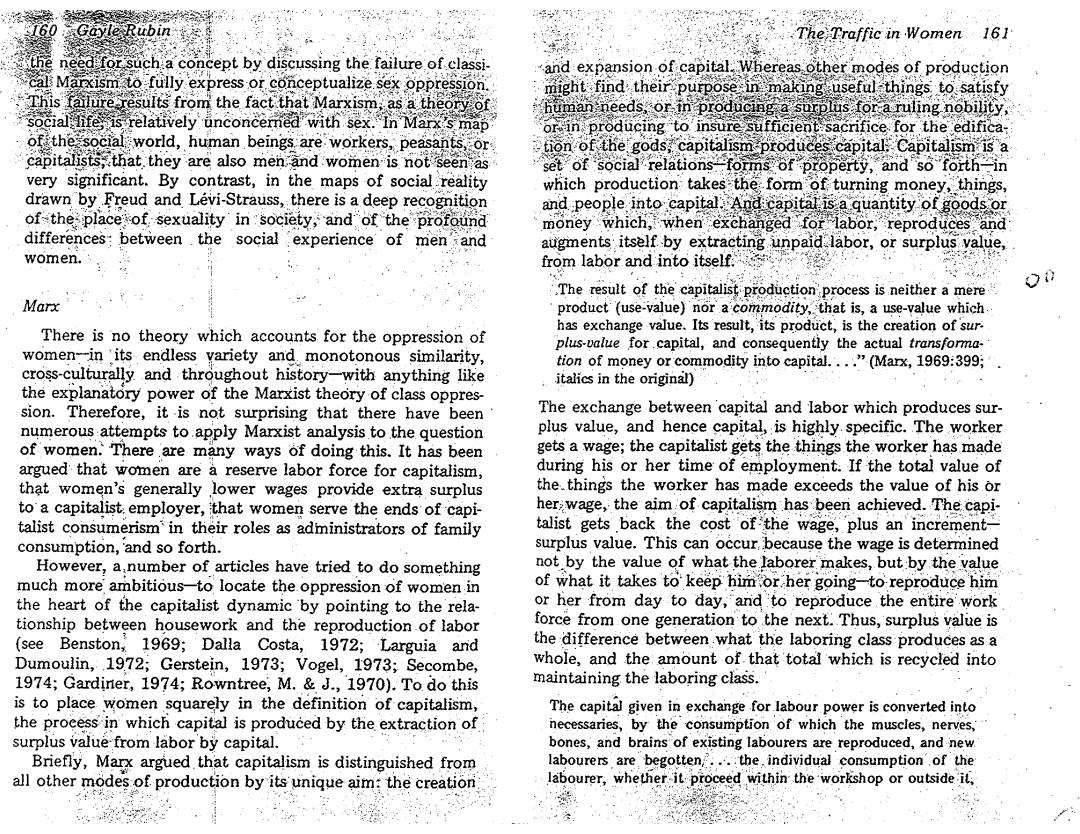正在加载图片...

60 The Fraffic in Women 16 need for such a concept by discussing the failure of classi- and expansion of capital Whereas other modes of production cal Marxism to fully express or conceptualize sex oppression. .This failure results from the fact that Marxism,as a theory of might find their purpose in making useful things to satisfy social life,is relatively unconcemed with sex.In Marx's map human needs,or in producing a surplus for a ruling nobility, orin producing to insure sufficient sacrifice for the edifica: of the social world,human beings are workers,peasants,or tion of the gods,capitalism produces capital.Capitalism is a capitalists,that they are also men and women is not seen as set of social relations forms of property,and so forth in very significant.By contrast,in the maps of social reality which production takes the form of turning money,things, drawn by Freud and Levi-Strauss,there is a deep recognition and people into capital.And capital is a quantity of goods or of the place of sexuality in society,and of the profound money which,when exchanged for labor,reproduces and differences:between.the social experience of men'and 4 augments itself by extracting unpaid labor,or surplus value, women. from labor and into itself. .The result of the capitalist production process is neither a mere Marx product (use-value)nor a commodity,that is,a use-value which has exchange value.Its result,its product,is the creation of sur. There is no theory which accounts for the oppression of women-in'its endless variety and monotonous similarity, plus-value for capital,and consequently the actual transforma- tion of money or commodity into capital...."(Marx,1969:399; cross-culturally and throughout history-with anything like italics in the original) the explanatory power of the Marxist theory of class oppres- sion.Therefore,it is not surprising that there have been The exchange between capital and labor which produces sur- numerous attempts to apply Marxist analysis to the question plus value,and hence capital,is highly.specific.The worker of women.:There are many ways of doing this.It has been gets a wage;the capitalist gets the things the worker has made argued that women are a reserve labor force for capitalism, during his or her time of employment.If the total value of that women's generally lower wages provide extra surplus the.things the worker has made exceeds the value of his or to a capitalist.employer,that women serve the ends of capi- her wage,the aim of capitalism has been achieved.The capi- talist consumerism in their roles as administrators of family talist gets back the cost of the wage,plus an increment- consumption,'and so forth. surplus value.This can occur because the wage is determined However,a number of articles have tried to do something not by the value of what the laborer makes,but by the value much more ambitious-to locate the oppression of women in of what it takes to keep himor her going-to reproduce him the heart of the capitalist dynamic by pointing to the rela- or her from day to day,and to reproduce the entire work tionship between housework and the reproduction of labor force from one generation to the next.Thus,surplus value is (see Benston,1969;Dalla Costa,1972;Larguia and the difference between what the laboring class produces as a Dumoulin,1972;Gerstein,1973;Vogel,1973;Secombe, whole,and the amount of.that total which is recycled into 1974;Gardiner,1974;Rowntree,M.J.,1970).To do this maintaining the laboring class. is to place women squarely in the definition of capitalism, The capital given in exchange for labour power is converted into the process in which capital is produced by the extraction of necessaries,by the consumption of which the muscles,nerves, surplus value from labor by capital. bones,and brains of existing labourers are reproduced,and new. Briefly,Marx argued.that capitalism is distinguished from labourers are begottenthe,individual consumptionof the all other modes of production by its unique aim:the creation labourer,whether it proceed within the workshop or outsideit